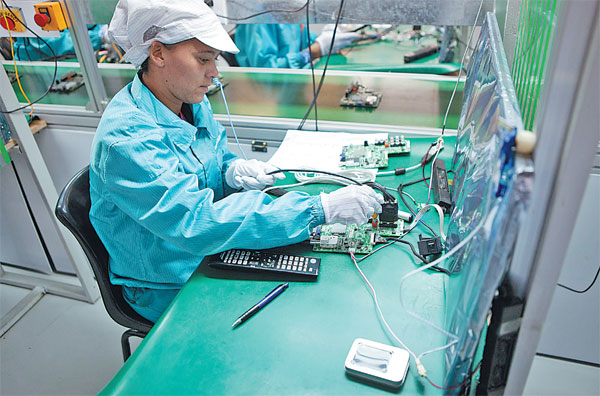Chinese companies take root, flourish in Africa


QINGDAO - When Hisense, a Chinese consumer electronics company, opened its plant in South Africa in 2013, local employees took the bus or carpooled to get to work. Now, most of them drive their own cars and sometimes "scramble" to find a parking spot.
"Some of the cars are second-hand or entry-class, but it still highlights the improved income and living standard," Li Youbo, manager of the South African branch of Hisense, told Xinhua on Wechat.
Headquartered in East China's Qingdao city, Hisense has been expanding its business in Africa since 2000, when it built a TV production line in Johannesburg. In 2013, it opened another plant in Atlantis, about 50 kilometers from the city of Cape Town.
Last year, Hisense produced 261,000 refrigerators and 389,000 televisions in South Africa.
Liu Xin, general manager of Hisense's international marketing company, said Hisense South Africa hired 700 local employees, accounting for over 90 percent of the total staff. Thirty-three of them are senior executives and managers.
Reagan Adonis, 33, joined Hisense five years ago as a fridge quality inspector. Now he has been promoted to the supervisor in charge of quality assessment for 13 production groups.
"My family could hardly make ends meet before I found a job here. But now, I am able to send my four children to school," he said.
He also coaches the plant's football team in his spare time. Last year, his team won the championship in Atlantis' amateur football league.
Liu said the attendance rate at Hisense South Africa topped 98 percent, which was very impressive.
"Our employees turned leftover materials into storage racks and stools. An employee named Lucky even helped us solve a technical problem concerning the refrigerator's rubber door seal. The rubber door seal workshop in our plant was therefore named after him," Li said.
Besides TVs and fridges, Hisense's South Africa plant now also produces freezers, cellphones, AC units, washing machines, and kitchen appliances, which have entered a total of 5,112 shops belonging to 18 chain stores across South Africa.
In addition to meeting the market demand in South Africa, the products are exported to a dozen other African countries and regions including Mozambique, Zimbabwe, Malawi, Zambia, Mauritius, Mayotte, Reunion, and Madagascar, according to Hisense.
As the production capacity expanded, Hisense supported some of its employees to start their own companies that provide auxiliary products such as fridge rubber seals and condensers. They were able to lease equipment from Hisense during the initial stage of production.
"Such startups not only create bigger room for Hisense's development in South Africa but also help speed up the country's industrialization," Li said.
Leng Jing, a researcher at the Qingdao Academy of Social Sciences, said current China-Africa cooperation has expanded from government assistance to enterprise investment and financing cooperation, from general merchandise trade to capacity cooperation and processing trade, from project contracting to middle and high-end industries.
The China-Africa Development Fund, the first stock equity fund set up in China that focuses on investment in Africa, has invested in 91 projects in 36 African countries, with a total investment of $4.5 billion. Those projects are estimated to promote over $20 billion of investment from Chinese companies in fields such as agriculture, infrastructure, capacity cooperation as well as resource exploitation.
Leng said direct investment from Chinese companies can improve African countries' ability to develop and create jobs locally, which echoes the objective of the Belt and Road Initiative.
- Xi, Ramaphosa open high-level dialogue between Chinese, South African scientists
- China a sincere partner for African countries: Rwandan experts
- Xi unveils plans to increase imports from South Africa
- Chinese automaker rolls first car off production line from S. Africa plant
- China-South Africa ties model for South-South cooperation, says Chinese ambassador



































